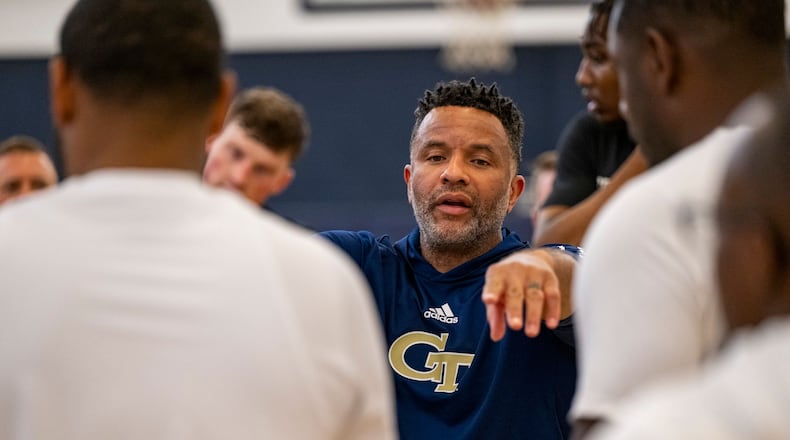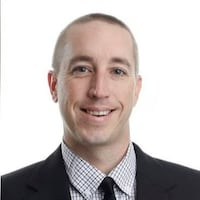Not more than five months into his tenure, Damon Stoudamire is still feeling things out as the 15th coach in Georgia Tech basketball history.
Stoudamire was hired in March after spending two seasons as an assistant coach with the NBA’s Boston Celtics. A former All-American at Arizona, NBA rookie of the year and coach at Pacific, Stoudamire takes over a Tech program that finished 15-18 last season and is coming off back-to-back losing seasons.
Stoudamire has added six transfers and a freshman to help fill out his roster and said he still has two available scholarships he plans to use as well.
The Atlanta Journal-Constitution sat down this week with Stoudamire to discuss the early state of his program:
(Some questions and answers have been edited for clarity and brevity.)
Q: When can we expect to see the 2023-24 schedule and how have you approached putting that schedule together?
A: It’s a work-in-progress. Until I see it with my own eyes, I’m under the belief that the ACC is a really good conference. I think sometimes everybody has to guard against a bad year, possibly. You got 23 games locked in. We have 20 ACC games, you play Georgia every year, you got the SEC/ACC Challenge, you’re going to play a neutral-site game at State Farm (Arena). If them games right there ain’t good enough for everybody? You got to schedule some wins.
We kind of put all these tricky words into play, but at the end of the day, what has happened is we basically went back to the ‘80s and the ‘90s when I was in college – strength of schedule. Now we’re calling it, “Quad 1, Quad 2, Quad 3, Quad 4,” when in reality it’s just strength of schedule. How it used to be was teams that were 18-14, if they played a top-50 schedule they went to the tournament. It seems like that’s what they’re trying to get back to.
Q: How have your first four-plus months been on the job?
A: It’s been good. It’s eye-opening from the standpoint of certain things. Standards and habits you want to break. Starting with the team you’re trying to create, it sounds cliché, but it’s a culture, and you’re trying to get those guys to practice good habits instead of bad. It’s always tricky. A lot of us don’t like looking in the mirror. But you kind of got to look in the mirror if you want to be good in order to play for me. You can’t run from it.
I don’t play in the gray area. If you’re playing well, you’re going to play. If you’re not, you’re not going to play. A lot of times your truths are going to tell on themselves. You got to have some type of discipline, which I preach to the guys. You got to have some type of routine that’s going to get you to where you need to get. You’ve got to balance that.
Getting them to understand those things, not even really concerning themselves with the big picture. It was just more trying to get guys to understand what’s my criteria for what I want. And getting them to understand this is what it will take to get on the floor to be a productive person on the floor.
A: Has the current roster bought in to those concepts?
Q: It’s a work-in-progress. I don’t think they trust each other. Forget the new coaching staff, I don’t think they trust each other. I’m a little different. I use words, and I use things that might be a little taboo for college basketball, but it’s all I know. I’ve been lucky, I’ve won, I’ve lost, so I know what they both look like. I’m trying to elevate their standards.
It all starts with trust. If there’s no trust and there’s no communication? That’s everybody in this building. That’s staff, that’s support staff.
I’ve seen it all. I’ve seen coach-killers, from a player standpoint, from an organizational standpoint. I’ve just seen it all. So for me, I just try to leave no stones untouched and trust the communication within this program, which just in general is big. We’ll get there. It’s not going to happen overnight, and I don’t expect it to happen overnight either. Little steps, brick by brick. We’ll get there.
Q: How will your previous success at Pacific translate to future success at Tech?
A: I think it’s different. No disrespect to Pacific, I can get a different kind of player. But the one thing these guys will have to buy-in that the guys at Pacific bought into is we had trust for one another. We did things the right way. We hung our hat on a couple things. Along with trust and communication, if you don’t pound people on the offensive glass, and if you don’t limit them to one shot, I don’t care who you are.
There’s a certain toughness you have to have to play for me. If you ain’t tough, it’s going to be hard for you to play for me. I can’t tolerate softness on the court. There’s nothing worse than when I played and when I coach, when you sit on the sideline and you’re looking and your team is not the toughest team on the court. You’ll lose a game, but we can’t get out-toughed. That bothers me.
“That don’t equate to nothing but effort. You don’t have to be good, you just have to give effort. Playing hard is where it starts. Rebounding is a byproduct of that.
Q: How did you go about assembling your staff?
A: I was looking for an older guy that had been a former head coach. I had a former head coach on my staff at Pacific. I think it just means something. Then I wanted to bring a couple guys that I felt deserved shots at the high-major level. Then I wanted to incorporate some NBA guys to kind of balance it out for me.
Q: What will determine whether this season has been a success or not?
A: In order not to lose sight of today, I try to focus on today. You start to look down the road and look down the line and, man, it can get overwhelming. I just try to win the day as much as I can. The left and the right-hand column is the one that means the most at the end of the day.
I would say this, this is going to sound crazy, but what defines this year for me will strictly be a standard. What’s our standard? We’ve got to have a standard. That goes back to toughness and the things that we adhere to. It’s looking the right way. I want people to watch my team and be like, ‘I see what they’re trying to do.’ I want guys playing hard and competing. Coaches got to look right. I’m a critiquer. Everything’s got to align.
When you’re thinking the program and how you want things to go, the most-important thing is that when somebody on the outside asks somebody on the inside how the program is? And their face don’t turn up? I think you’ve done your job.
Our staff, I think they enjoy coming to work every day. I think we’re still feeling each other out. Nobody knows what to expect. They’re trying to feel me out. But I like guys that work.
About the Author
Keep Reading
The Latest
Featured


